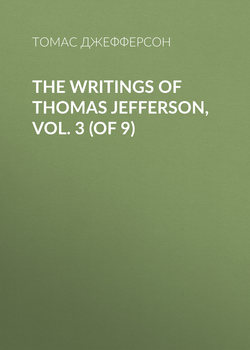Читать книгу The Writings of Thomas Jefferson, Vol. 3 (of 9) - Томас Джефферсон, Thomas Jefferson - Страница 20
PART II.—Continued.
LETTERS WRITTEN WHILE IN EUROPE.
1784-1790
TO MONSIEUR DE ST. ETIENNE
ОглавлениеParis, June 3, 1789.
Sir,—After you quitted us yesterday evening, we continued our conversation (Monsieur de La Fayette, Mr. Short and myself) on the subject of the difficulties which environ you. The desirable object being, to secure the good which the King has offered, and to avoid the ill which seems to threaten, an idea was suggested, which appearing to make an impression on Monsieur de La Fayette, I was encouraged to pursue it on my return to Paris, to put it into form, and now to send it to you and him. It is this; that the King, in a seance royale should come forward with a Charter of Rights in his hand, to be signed by himself and by every member of the three orders. This charter to contain the five great points which the Resultat of December offered, on the part of the King, the abolition of pecuniary privileges offered by the privileged orders, and the adoption of the national debt, and a grant of the sum of money asked from the nation. This last will be a cheap price for the preceding articles; and let the same act declare your immediate separation till the next anniversary meeting. You will carry back to your constituents more good than ever was effected before without violence, and you will stop exactly at the point where violence would otherwise begin. Time will be gained, the public mind will continue to ripen and to be informed, a basis of support may be prepared with the people themselves, and expedients occur for gaining still something further at your next meeting, and for stopping again at the point of force. I have ventured to send to yourself and Monsieur de La Fayette a sketch of my ideas of what this act might contain, without endangering any dispute. But it is offered merely as a canvas for you to work on, if it be fit to work on at all. I know too little of the subject, and you know too much of it, to justify me in offering anything but a hint. I have done it, too, in a hurry; insomuch, that since committing it to writing, it occurs to me that the fifth article may give alarm; that it is in a good degree included in the fourth, and is, therefore, useless. But after all, what excuse can I make, Sir, for this presumption. I have none but an unmeasurable love for your nation, and a painful anxiety lest despotism, after an unaccepted offer to bind its own hands, should seize you again with tenfold fury. Permit me to add to these, very sincere assurances of the sentiments of esteem and respect, with which I have the honor to be, Sir, your most obedient, and most humble servant.
[The annexed is the Charter accompanying the two preceding letters.]
A Charter of Rights, solemnly established by the King and Nation
1. The States General shall assemble, uncalled, on the first day of November, annually, and shall remain together so long as they shall see cause. They shall regulate their own elections and proceedings, and until they shall ordain otherwise, their elections shall be in the forms observed in the present year, and shall be triennial.
2. The States General alone shall levy money on the nation, and shall appropriate it.
3. Laws shall be made by the States General only, with the consent of the King.
4. No person shall be restrained of his liberty, but by regular process from a court of justice, authorized by a general law. (Except that a Noble may be imprisoned by order of a court of justice, on the prayer of twelve of his nearest relations.) On complaint of an unlawful imprisonment, to any judge whatever, he shall have the prisoner immediately brought before him, and shall discharge him, if his imprisonment be unlawful. The officer in whose custody the prisoner is, shall obey the orders of the judge; and both judge and officer shall be responsible, civilly and criminally, for a failure of duty herein.
5. The military shall be subordinate to the civil authority.
6. Printers shall be liable to legal prosecution for printing and publishing false facts, injurious to the party prosecuting; but they shall be under no other restraint.
7. All pecuniary privileges and exemptions, enjoyed by any description of persons, are abolished.
8. All debts already contracted by the King, are hereby made the debts of the nation; and the faith thereof is pledged for their payment in due time.
9. Eighty millions of livres are now granted to the King, to be raised by loan, and reimbursed by the nation; and the taxes heretofore paid, shall continue to be paid to the end of the present year, and no longer.
10. The States General shall now separate, and meet again on the 1st day of November next.
Done, on behalf of the whole nation, by the King and their representatives in the States General, at Versailles, this – day of June, 1789.
Signed by the King, and by every member individually, and in his presence.
